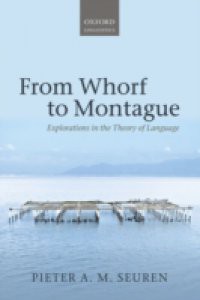This book explores the relations between language, the world, the minds of individual speakers, and the collective minds of particular language communities. Pieter Seuren examines the status of abstract rule systems underlying speech and considers how much computational power may be attributed to the human mind. The book opens with chapters on the social reality of language, the ancient question of the primacy of language or thought, and the relation betweenuniversal and language-specific features. Professor Seuren then considers links between language, logic, and mathematics: he suggests the facts of language require a theory with abstract principles, and that grammars should be seen as mediating between propositionally structured thoughts and systems, such asspeech, for the production of utterances. He argues that grammars are neither autonomous nor independent of meaning. He concludes by considering how a fundamental rephrasing of the basic principles of logic could reconnect it with cognition and language and involve a principled rejection of possible-world semantics.

